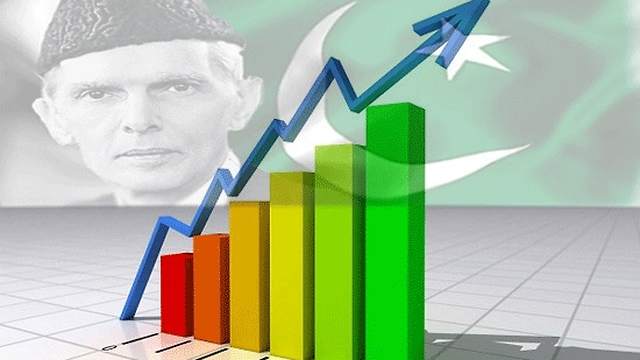Will we be the 16th largest economy in 2050?

By
Khurram Husain |
2/16/2017
A REPORT by PwC has everyone talking due to a claim reportedly made in it that Pakistan will be the world`s 16th largest economy by the year 2050.
The finance minister has gone the extra mile by publicly congratulating the country on the `economic turnaround` affected by his government, citing the PwC report and an opinion piece in Bloomberg by George Mason University`s Professor Tyler Cowen, in which he says that `most of Pakistan`s developments are fairly positive`.
Unfortunately, the finance minister, in his enthusiasm, claimed that Bloomberg has also declared Pakistan as the most underrated economy in the world in its recent report titled Pakistan`s Economy Is a Pleasant Surprise. In f act, the piece in question is not a `report` but an opinion column, and below it, the following disclaimer is clearly featured: `This column does not necessarily reflect the opinion of the editorial board or Bloomberg LP and its owners.
In any case, let`s take the example of the PwC report since it is weightier and the claim being made sounds far more spectacular. The first thing to note is this: the PwC report does not say anywhere that Pakistan is going to be the 16th largest economy in the world by 2050. What it says is that Pakistan has the potential to be the 16th largest economy in the world by 2050. There is an important difference between both claims, and it should be borne in mind before popping any corks.
So the first obvious question to ask is this: what needs to be done in order to unlock this potential? The PwC report does not dwell on Pakistan in any detail. It features extended analyses on Poland, India, China, and Brazil, as well as boxed analyses on Turkey, Nigeria, and Columbia. It pinpoints Vietnam, India and Bangladesh `to be three of the world`s fastest-growing economies` till 2050, and says `Mexico could be larger than the UK and Germany by 2050`. Pakistan only features on a couple of lists presented in the report, showing it as having the potential to become a large economy by 2050 in purchasing power parity terms.
`To realize this growth potential,` the report says at the outset, `emerging market governments need to implement structural reforms to improve macroeconomic stability, diversify their economies away from undue reliance on natural resources (where this is currently the case), and develop effective political and legal institutions`.
Next question to ask is: how do they make their projections? What methodology do they use? The report projects future GDP growth rates based on four variables demographics, or the growth of a working-age population; growth in quality of the workforce, measured through average education levels in the workforce; growth in physical capital stock, measured as new investment minus depreciation of existing stock; and technological progress.
As any of these indicators improve, the projection for that country`s future GDP growth rate goes up. On top of that, they make an assumption about real market exchange rates relative to purchasing power parity rates. So if a country is a food importer, and its exchange rate depreciates significantly over time, that would make its food more expensive, thereby lowering its GDP in purchasing power parity terms.
A significant share of the boost that Pakistan gets in this projection comes from the large growth of its working-age population till 2050, compared to the ageing populations of the advanced industrial West or the advanced countries of the Far East (Japan and Korea for example and China`s workforce will be weighed down in the decades to come due to its one-child policy).
Second, Pakistan is food self-sufficient, which means food prices are relatively immune from international shocks, and below what they are in many other countries at the same level of development. This gives a boost to our GDP in purchasing power parity terms.
And that`s pretty much all folks. This methodology says we should grow rather spectacularly in the decades to come because the sheer number of able-bodied people available to work will increase and we can grow enough food to feed them all while keeping food prices under check. In fact, as per the data in the report, Pakistan has the second largest growth in the number of average working age population till 2050,afterEgypt.
The long story here is that the projections made in the report come with a heavy caveat. In order to unlock this potential, we will need further reforms in our political and institutional systems of rule, as well as diversification of our manufacturing base, increase productivity, and fix our balance of payments to underpin macroeconomic stability.
The short story is that, in our case, the methodology used to make the projections has given us a boost largely on the basis of a growing population.
If we can continue investing in our capital stock at present levels, and educate and feed each of these working-age members of the population at cheap rates, then our economy will have this potential.
The report is not meant to spark national celebrations. It is not even meant as a guide for policymakers. It is mainly aimed at large corporations and is trying to tell their leadership that, over the long run, the trade winds are blowing eastward.
Therefore, in order to position their enterprises to capture the dividends that this large, irreversible shift of economic dynamism towards the east is going to bring, they need to start entering markets like China and India n and solidify their presence in these economies. And in doing so, it uses a very broad brushstroke methodology to highlight the underlying sources of strength in the new centers of dynamism.
Pakistan found itself on the list largely by accident, by virtue of its young population and food self-sufficiency. Perhaps we`ll tap this potential, but let`s not pop any corks just yet.
The writer is a member of staff.
khurram.husain@gmail.com Twitter: @khurramhusain
Editor’s Note: Even today, Pakistan’s underground tax evaders run economy is bigger than the prevailing economy.









